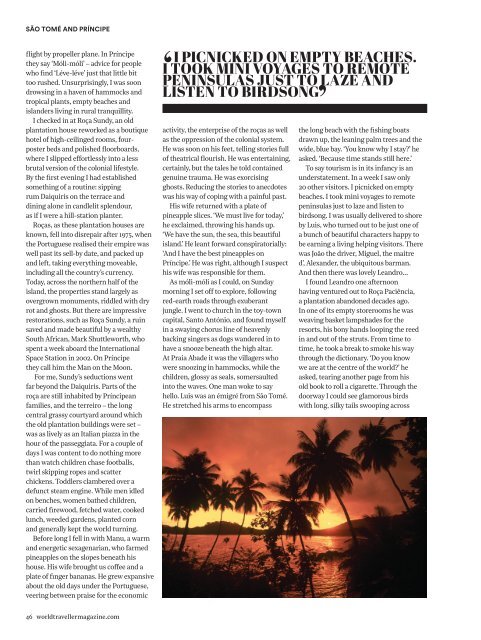Create successful ePaper yourself
Turn your PDF publications into a flip-book with our unique Google optimized e-Paper software.
SÃO TOMÉ AND PRÍNCIPE<br />
flight by propeller plane. In Príncipe<br />
they say ‘Móli-móli’ – advice for people<br />
who find ‘Léve-léve’ just that little bit<br />
too rushed. Unsurprisingly, I was soon<br />
drowsing in a haven of hammocks and<br />
tropical plants, empty beaches and<br />
islanders living in rural tranquillity.<br />
I checked in at Roça Sundy, an old<br />
plantation house reworked as a boutique<br />
hotel of high-ceilinged rooms, fourposter<br />
beds and polished floorboards,<br />
where I slipped effortlessly into a less<br />
brutal version of the colonial lifestyle.<br />
By the first evening I had established<br />
something of a routine: sipping<br />
rum Daiquiris on the terrace and<br />
dining alone in candlelit splendour,<br />
as if I were a hill-station planter.<br />
Roças, as these plantation houses are<br />
known, fell into disrepair after 1975, when<br />
the Portuguese realised their empire was<br />
well past its sell-by date, and packed up<br />
and left, taking everything moveable,<br />
including all the country’s currency.<br />
Today, across the northern half of the<br />
island, the properties stand largely as<br />
overgrown monuments, riddled with dry<br />
rot and ghosts. But there are impressive<br />
restorations, such as Roça Sundy, a ruin<br />
saved and made beautiful by a wealthy<br />
South African, Mark Shuttleworth, who<br />
spent a week aboard the International<br />
Space Station in 2002. On Príncipe<br />
they call him the Man on the Moon.<br />
For me, Sundy’s seductions went<br />
far beyond the Daiquiris. Parts of the<br />
roça are still inhabited by Príncipean<br />
families, and the terreiro – the long<br />
central grassy courtyard around which<br />
the old plantation buildings were set –<br />
was as lively as an Italian piazza in the<br />
hour of the passeggiata. For a couple of<br />
days I was content to do nothing more<br />
than watch children chase footballs,<br />
twirl skipping ropes and scatter<br />
chickens. Toddlers clambered over a<br />
defunct steam engine. While men idled<br />
on benches, women bathed children,<br />
carried firewood, fetched water, cooked<br />
lunch, weeded gardens, planted corn<br />
and generally kept the world turning.<br />
Before long I fell in with Manu, a warm<br />
and energetic sexagenarian, who farmed<br />
pineapples on the slopes beneath his<br />
house. His wife brought us coffee and a<br />
plate of finger bananas. He grew expansive<br />
about the old days under the Portuguese,<br />
veering between praise for the economic<br />
‘<br />
I PICNICKED ON EMPTY BEACHES.<br />
I TOOK MINI VOYAGES TO REMOTE<br />
PENINSULAS JUST TO LAZE AND<br />
LISTEN TO BIRDSONG<br />
’<br />
activity, the enterprise of the roças as well<br />
as the oppression of the colonial system.<br />
He was soon on his feet, telling stories full<br />
of theatrical flourish. He was entertaining,<br />
certainly, but the tales he told contained<br />
genuine trauma. He was exorcising<br />
ghosts. Reducing the stories to anecdotes<br />
was his way of coping with a painful past.<br />
His wife returned with a plate of<br />
pineapple slices. ‘We must live for today,’<br />
he exclaimed, throwing his hands up.<br />
‘We have the sun, the sea, this beautiful<br />
island.’ He leant forward conspiratorially:<br />
‘And I have the best pineapples on<br />
Príncipe.’ He was right, although I suspect<br />
his wife was responsible for them.<br />
As móli-móli as I could, on Sunday<br />
morning I set off to explore, following<br />
red-earth roads through exuberant<br />
jungle. I went to church in the toy-town<br />
capital, Santo António, and found myself<br />
in a swaying chorus line of heavenly<br />
backing singers as dogs wandered in to<br />
have a snooze beneath the high altar.<br />
At Praia Abade it was the villagers who<br />
were snoozing in hammocks, while the<br />
children, glossy as seals, somersaulted<br />
into the waves. One man woke to say<br />
hello. Luis was an émigré from São Tomé.<br />
He stretched his arms to encompass<br />
the long beach with the fishing boats<br />
drawn up, the leaning palm trees and the<br />
wide, blue bay. ‘You know why I stay?’ he<br />
asked. ‘Because time stands still here.’<br />
To say tourism is in its infancy is an<br />
understatement. In a week I saw only<br />
20 other visitors. I picnicked on empty<br />
beaches. I took mini voyages to remote<br />
peninsulas just to laze and listen to<br />
birdsong. I was usually delivered to shore<br />
by Luis, who turned out to be just one of<br />
a bunch of beautiful characters happy to<br />
be earning a living helping visitors. There<br />
was João the driver, Miguel, the maitre<br />
d’, Alexander, the ubiquitous barman.<br />
And then there was lovely Leandro…<br />
I found Leandro one afternoon<br />
having ventured out to Roça Paciência,<br />
a plantation abandoned decades ago.<br />
In one of its empty storerooms he was<br />
weaving basket lampshades for the<br />
resorts, his bony hands looping the reed<br />
in and out of the struts. From time to<br />
time, he took a break to smoke his way<br />
through the dictionary. ‘Do you know<br />
we are at the centre of the world?’ he<br />
asked, tearing another page from his<br />
old book to roll a cigarette. Through the<br />
doorway I could see glamorous birds<br />
with long, silky tails swooping across<br />
46 worldtravellermagazine.com

















